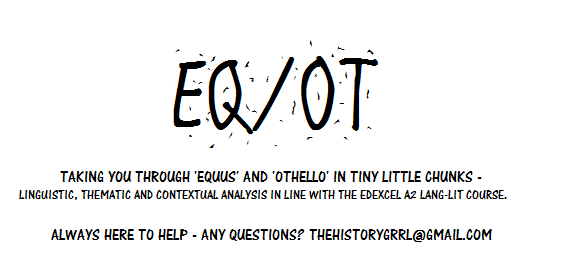'Dramatic Intentions' are a concept which may well be alien to non-theatre students, but which are crucial to the understanding of any play - especially given the number of marks given in this exam to the understanding of the plays as plays.
An outline of dramatic intentions within "Basic Drama Theory" is given in Wikipedia.
So, what are they?
They're what the playwright or director wants an audience to get out of a play; for example the dramatic intentions in a comedy would be to amuse.
In some plays they are more evident than others; for example, in 'Equus', it can be seen fairly easily that Shaffer wants his audience to question psychoanalysis and the justice system, as well as the role of nurture and environment in the personality and psychosis of a child.
In 'Othello', however, dramatic intentions are harder to decide; they could be to lead the audience to question the role of race, or Iago's motives, or the nature of evil. None of these has a truly solid grounding, the way that the intentions for 'Equus' seem to, and so a degree of hedging in thus necessary so as not to generalise or make wild assertions with which the examiner could easily disagree.
Questions? Ask :)
- HistGrrl x
Showing posts with label psychiatry. Show all posts
Showing posts with label psychiatry. Show all posts
Saturday, 5 June 2010
Dramatic Intentions
Labels:
AO2,
AO3,
dramatic form,
dramatic intentions,
equus,
explanation,
Iago,
justice,
motives,
othello,
psychiatry,
race,
Shaffer
'Equus' Synopsis
Equus, by Peter Shaffer, tells the story of a psychiatrist, Martin Dysart, who is asked to treat a particularly disturbed young boy named Alan Strang.
Strang has blinded six horses for no apparent reason, having been a horse lover all his life, and through a investigations into his past, upbringing and family background, Dysart begins to create a picture of what lead to this crime.
Through this, however, he is also lead to doubt the power of his profession: he sees that Alan has more passion in his life than he himself, in an unhappy marriage, has ever had, and knows that it is his duty to take this passion from the boy in order to make him "normal".
Through the play, the audience are lead to consider injustice, the morality of psychiatry, the influence of parents, the power of religion, and, ultimately, what it means to be normal.
Synopsis (c) TheHistoryGrrl 2010
For a more detailed synopsis, see wikipedia.
Subscribe to:
Posts (Atom)
